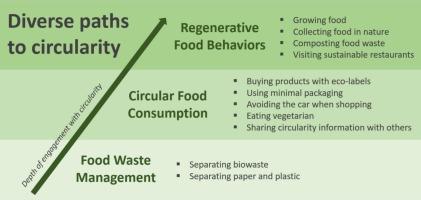不同的循环路径:循环饮食行为的集群及其预测因素
IF 9.6
1区 环境科学与生态学
Q1 ENVIRONMENTAL STUDIES
引用次数: 0
摘要
向循环食品系统过渡需要大规模改变公民的食品相关行为,如以循环方式种植、购买、共享和处置食品。现有的研究主要集中在孤立的特定行为上,而忽略了这些行为如何相互作用。此外,目前尚不清楚价值取向和社会经济特征在多大程度上预测了人们对循环食物行为的参与。本研究通过收集N = 955名荷兰公民的数据来解决这些差距,以调查是否存在不同的循环食品行为集群,以及价值观和社会经济特征如何影响这些集群的参与。利用探索性和验证性因素分析相结合,我们确定了三个具有不同程度有意循环承诺的行为集群:循环废物管理、循环食品消费和再生食品行为。我们的研究结果表明,生物圈值一致且积极地预测所有集群的参与度,而享乐值则是强烈的负面预测因子。社会经济因素,如教育水平和农村居住,表现出不同的影响。基于这些见解,我们为更广泛地采用循环食物行为提供了有针对性的政策和干预措施建议。本文章由计算机程序翻译,如有差异,请以英文原文为准。

Diverse paths to circularity: Clusters of circular food behaviors and their predictors
A transition towards a circular food system requires large-scale changes in citizens' food-related behaviors such as growing, purchasing, sharing, and disposing of food products in a circular manner. Existing research has largely focused on specific behaviors in isolation, neglecting how these behaviors may interplay. Moreover, it remains unclear to what extent value orientations and socio-economic characteristics predict engagement in circular food behaviors. This study addresses these gaps by collecting data from N = 955 Dutch citizens to investigate whether different clusters of circular food behaviors exist and how values and socio-economic characteristics influence participation in these clusters. Using a combination of exploratory and confirmatory factor analysis, we identify three behavioral clusters with varying levels of intentional commitment to circularity: circular waste management, circular food consumption, and regenerative food behaviors. Our findings indicate that biospheric values consistently and positively predict engagement across all clusters, while hedonic values are strong negative predictors. Socioeconomic factors, such as education level and rural residency, showed varying effects. Based on these insights, we provide suggestions for targeted policies and interventions for a broader adoption of circular food behaviors.
求助全文
通过发布文献求助,成功后即可免费获取论文全文。
去求助
来源期刊

Sustainable Production and Consumption
Environmental Science-Environmental Engineering
CiteScore
17.40
自引率
7.40%
发文量
389
审稿时长
13 days
期刊介绍:
Sustainable production and consumption refers to the production and utilization of goods and services in a way that benefits society, is economically viable, and has minimal environmental impact throughout its entire lifespan. Our journal is dedicated to publishing top-notch interdisciplinary research and practical studies in this emerging field. We take a distinctive approach by examining the interplay between technology, consumption patterns, and policy to identify sustainable solutions for both production and consumption systems.
 求助内容:
求助内容: 应助结果提醒方式:
应助结果提醒方式:


